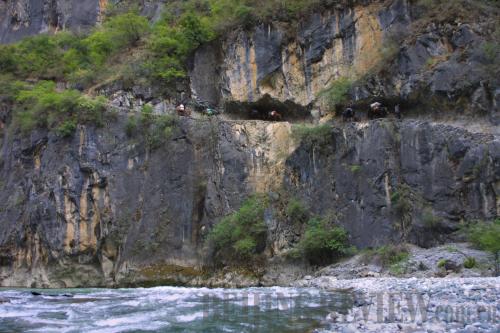|
 |
|
LIFE ON THE EDGE: A narrow post road cutting on steep cliffs is the only passage through which residents at Bala Village can walk out of the mountains before the construction of an asphalt road by Sonam Dhundrup (COURTESY SONAM DHUNDRUP) |
Sitting in his traditionally styled three-story Tibetan home and drinking butter tea, Pema Dhundrup, 82, eyes the asphalt road in front of his house in Shuizhuang Village, a Tibetan settlement in Shangri-La County of southwest China's Yunnan Province. "It is this road that leads us out of the mountains to live a happy life," he said.
The man responsible for building the road is Sonam Dhundrup, who is regarded as a hero by many local people. "He has changed Bala Village where we used to live, and he has awoken the grand canyon of Balagezong," said Pema Dhundrup.
A man of entrepreneurship
The canyon of Balagezong is surrounded by steep cliffs, isolating Bala from the outside world. The mountains—beautiful in the eyes of outsiders—symbolize transportation woes for the locals. Before 2008, a post road less than 1 meter wide was the only passage connecting the village with the outside world. Villagers had to walk more than four days to reach the county seat of Shangri-La. If a senior villager were to fall ill, the only option was for younger villagers to carry him to a hospital. Most people here disliked having such an isolated lifestyle, and the village's fortunes continued to deteriorate, with the number of households dropping from 60 several decades ago to only 14 in 2004.
In 1964, Sonam Dhundrup was born into a family of six children in Bala. At that time, most of the villagers earned their livelihood by hunting or growing barley and corn, which was barely enough to sustain them. The village had no access to electricity or radio and TV signals, and what people could do after dark was limited to dining and sleeping.
"Flashlights were the only 'hi-tech' products the villagers had. They wrapped flashlights with ox hide and regarded them as a treasure," said Sonam Dhundrup, who never wore shoes before he turned 10, as was the case for most children in the village. In 1974, his father took him to the county seat for the first time. Observing the "wide" road and automobiles in the county seat, Sonam Dhundrup realized he longed to break free and explore life outside the mountains.
When he was 13, Sonam Dhundrup decided to seek his fortune away from home.
Carrying 35 yuan ($5.68) his father gave him, as well as a bag of rock crystals he picked from the mountains, Sonam Dhundrup set out on his grand adventure. First he did business in several large and medium-sized cities in and outside Yunnan, where he sold rock crystal and caterpillar fungus—used in Chinese medicine—from his hometown. Later, he moved on to transporting video recorders, tapes, sports shoes and wears and bicycles to rural areas in Yunnan, selling them at village fairs for good profits.
After learning Mandarin Chinese, Sonam Dhundrup adapted well to life outside his hometown. Going from setting up a stand on the street to engaging in large-scale wholesaling, his business grew rapidly. He set up the first hardware shop and the first hotpot restaurant in Shangri-La in the early 1990s, and amassed a small fortune shortly thereafter.
Then Sonam Dhundrup made a resolution: to connect Bala to the outside world.
"Having money doesn't mean being rich. If I was satisfied with my own cozy life and had forgotten my hometown, I would dishonor myself," Sonam Dhundrup explained himself.
A difficult endeavor
Building a road on steep cliffs may have seemed to some like an unrealistic fantasy.
"All of my family were against him building the road, because we thought it was unrealistic and he'd waste his money," said Lobsang Tashi, a businessman and one of the younger brothers of Sonam Dhundrup.
Tashi Tsering, 47, is Pema Dhundrup's son and a childhood friend of Sonam Dhundrup. "We all thought Sonam Dhundrup was being childish when we heard he wanted to build the road. It seemed an impossible feat," he said.
Many highway design teams refused to work on the project after carrying out surveys of the terrain, and a number of construction teams had to leave because their excavation machinery couldn't be placed on such uneven ground.
| 